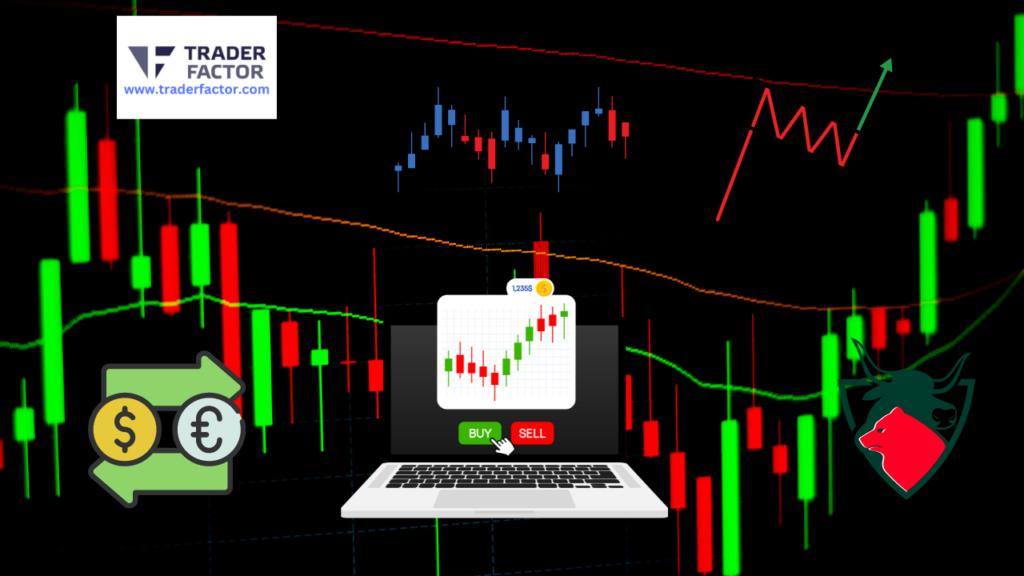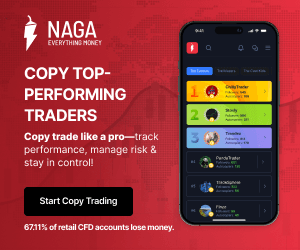As a beginner, you’ll want a stock trading app that’s easy to navigate, provides robust educational resources, and won’t break the bank with high fees. Look for apps that offer a clean interface, low or no commission rates, and a variety of educational tools like video tutorials and interactive webinars. These features will help you quickly get up to speed on trading basics and allow you to start investing confidently. Best Stock Trading App for Beginners: Secure payment methods and strong regulatory compliance are also essential to guarantee that your investments are safe. By exploring these apps further, you’ll discover which one aligns best with your financial goals and trading style.
Table of Contents
ToggleFeatures Comparison
ActivTrades
ActivTrades stands out for its intuitive interface, which makes it easy for beginners to start trading. The platform offers comprehensive educational tools, including webinars, tutorials, and articles, to help new traders understand the market. ActivTrades’ fee structure is also attractive, with competitive spreads and no hidden charges. Advanced charting tools and a wide range of indicators provide everything a beginner needs to make informed trading decisions. Customer support is accessible 24/5 and available in multiple languages, ensuring help is always at hand.
Best For: Beginners seeking a balance between ease of use and advanced trading tools.
PrimeXBT
PrimeXBT is known for its user-friendly platform and straightforward navigation, making it a great option for beginners. However, its educational resources are somewhat limited compared to other platforms. PrimeXBT offers a competitive fee structure with low commissions, which is appealing for those starting with small investments. The platform also provides advanced trading tools with leverage options, allowing users to amplify their trades. Customer support is available 24/7 via chat and email, ensuring users can get help whenever they need it.
Best For: Beginners interested in leveraged trading and cryptocurrency markets.
IronFX
IronFX features a simple and clean interface that is easy for beginners to navigate. The platform excels in providing extensive educational materials and market analysis, making it a good choice for those who want to learn more about trading. IronFX offers low spreads and commission fees, making it cost-effective for new traders. The platform also provides robust trading tools and multiple account types to suit different trading preferences. Personalized account managers offer 24/5 support, providing tailored assistance to users.
Best For: Beginners looking for a comprehensive educational platform and personalized support.
OneRoyal
OneRoyal offers an easy-to-navigate platform that is straightforward for beginners. While its educational resources are decent, including webinars, they are not as extensive as those offered by some competitors. The fee structure is competitive, making it an affordable option for new traders. OneRoyal’s trading tools are basic but sufficient for novice traders who don’t want to be overwhelmed with too many features. Customer support is responsive and available 24/5, ensuring users can get help when needed.
Best For: Beginners who prefer a straightforward trading experience without overwhelming features.
eToro
eToro is renowned for its highly intuitive platform and social trading features, making it a popular choice among beginners. The platform offers rich educational resources and a demo account for practice. While eToro charges zero commission on stocks, its spreads can be higher than some competitors. Unique features like social trading and the CopyTrader function allow users to mimic the trades of experienced investors, which can be invaluable for learning. Customer support is available 24/5 via chat and email.
Best For: Beginners interested in social trading and learning from experienced traders.
Pepperstone
Pepperstone provides an easy-to-use platform with a focus on forex trading. The platform is equipped with comprehensive educational tools and market analysis, making it suitable for beginners who want to delve into forex. Pepperstone’s low spreads and commission-based pricing make it an attractive option for cost-conscious traders. It also offers advanced trading tools and third-party integrations, providing a robust trading environment. Customer support is accessible 24/5 via chat, email, and phone.
Best For: Beginners focused on forex trading with access to advanced tools.
TD Ameritrade
TD Ameritrade is a feature-rich platform that is highly user-friendly. It offers extensive educational resources and a vast library of content, making it an excellent choice for beginners who want to learn as much as possible. The platform charges zero commission on stocks and ETFs, making it cost-effective for new traders. Advanced trading tools, including the Thinkorswim platform, provide a comprehensive trading experience. Customer support is available 24/7 via chat, email, and phone, ensuring users can always get assistance.
Best For: Beginners looking for a comprehensive platform with extensive educational resources.
Interactive Brokers
Interactive Brokers is slightly complex for absolute beginners but becomes powerful once learned. It offers extensive educational resources, including webinars and tutorials, to help new traders get up to speed. The platform’s low commissions with tiered pricing are attractive for cost-conscious traders. Interactive Brokers provides robust trading tools and wide market access, making it a versatile option for various trading styles. Customer support is available 24/5 via chat and email.
Best For: Beginners ready to invest time in learning a powerful platform with low fees.
Charles Schwab
Charles Schwab features an intuitive platform with a clean interface, making it easy for beginners to navigate. The platform offers extensive educational resources and market research, providing a wealth of information for new traders. Charles Schwab charges zero commission on stocks and ETFs, making it a cost-effective choice. Comprehensive trading tools and Schwab Intelligent Portfolios offer a well-rounded trading experience. Customer support is available 24/7 via chat, email, and phone, ensuring users can always get help.
Best For: Beginners seeking a well-rounded platform with excellent customer support.
Admiral Markets
Admiral Markets provides a user-friendly platform that is suitable for beginners. The platform offers rich educational resources, including webinars and articles, to help new traders learn the ropes. Competitive spreads and low commissions make it an attractive option for cost-conscious traders. Admiral Markets also offers advanced trading tools with MetaTrader integration, providing a robust trading environment. Customer support is available 24/5 via chat, email, and phone.
Best For: Beginners looking for a diverse range of educational materials and competitive fees.
EightCap
EightCap offers a simple and user-friendly interface that is easy for beginners to navigate. The platform provides decent educational resources and market analysis to help new traders get started. Low spreads and commission-based accounts make it affordable for beginners. EightCap also offers advanced trading tools and the MetaTrader suite, providing a comprehensive trading experience. Customer support is available 24/5 via chat and email.
Best For: Beginners looking for a straightforward trading experience with low fees.
Regulatory Compliance
Understanding the role of regulatory bodies is vital as they guarantee that stock trading apps comply with legal and ethical standards. When you’re choosing a trading app, you need to verify it adheres to rigorous compliance standards set by these authorities. This isn’t just about following rules; it’s about protecting you as an investor.
Regulatory bodies enforce trading regulations that maintain market integrity and safeguard your interests. Compliance with these standards prevents manipulation and fraud, guaranteeing a fair trading environment. Here’s how different regulators stack up regarding their focus areas:
| Regulator | Focus Area | Impact on You |
|---|---|---|
| SEC | Market Integrity | Protects against fraud |
| FCA | Investor Protection | Guarantees fair treatment |
| ASIC | Compliance Standards | Mitigates risks |
Each of these bodies has a unique role, but all aim to create a secure and transparent trading scenario for you. By selecting apps that are regulated by these authorities, you’re not just investing in stocks; you’re also investing in a promise of security and fairness. Don’t overlook this important aspect—always check an app’s regulatory status to verify your investments are well-protected.
Fee Structures
You’ll find that fee structures across stock trading apps can greatly impact your investment returns. Understanding these costs is essential for effective expense management and ensuring you’re maximizing the value of your investments. Here’s a breakdown of the factors to take into account:
- Fee Transparency: Always check if the app clearly discloses all trading costs. Transparency helps you avoid unexpected fees that can eat into your profits.
- Hidden Charges: Look out for hidden fees related to account maintenance, withdrawals, or inactivity. These can notably affect your net returns if not managed wisely.
- Trading Costs: Evaluate the cost per trade, as frequent trading on platforms with high fees can become expensive.
- Value Maximization: Consider apps that offer free trades or low-cost options to maximize the value of each transaction.
- Expense Management: Select apps that provide tools to help track and manage your trading expenses effectively.
Analytical Tools

Analytical tools empower you to dissect market trends and make informed decisions efficiently. When you’re maneuvering through the complexities of the stock market, the right tools can make a considerable difference. Technical indicators, such as moving averages and RSI (Relative Strength Index), provide insights into market sentiment and potential price movements. They’re essential for developing robust trading strategies that align with your investment goals.
Moreover, sophisticated charting tools allow for detailed market analysis. You can visualize data in various formats, spotting trends and patterns that might not be obvious at first glance. This level of detail is vital for timely decision-making and can greatly enhance your trading performance.

Data visualization also plays a pivotal role. It transforms complex datasets into understandable graphics, making it easier for you to grasp the nuances of market dynamics. Whether it’s line graphs, bar charts, or candlestick patterns, these visual aids help you analyze market conditions more effectively.
User Experience

As you navigate through various stock trading apps, the overall user experience can greatly influence your trading efficiency and satisfaction. The user interface design isn’t just about aesthetics; it’s essential for guaranteeing you can quickly find and execute trades with ease. A well-thought-out interface reduces the learning curve and helps you become proficient faster.
Here are some key aspects that enhance the user experience:
- User Interface Design: Clean, intuitive layouts that make navigation simple.
- User Engagement Strategies: Interactive elements that keep you informed and engaged.
- Mobile Usability Testing: Guarantees the app performs well on various devices, enhancing reliability.
- Onboarding Experience: Streamlined processes help you get started without confusion.
- Accessibility Features: Support for users with disabilities, guaranteeing everyone can trade effectively.

These elements are essential for a satisfying user experience. They not only make the app easier to use but also guarantee it is accessible to a wider audience. By focusing on these areas, developers can create a product that not only meets but exceeds your expectations, making your trading journey as smooth and efficient as possible.
Educational Resources

Building on the importance of a smooth user experience, educational resources in stock trading apps play a vital role in equipping you with the knowledge to make informed decisions. These resources range from interactive tutorials on trading terminology to in-depth courses on market analysis. They’re designed to help you grasp the nuances of trading strategies, investment psychology, and risk management.
Here’s a quick overview of the types of educational content you’ll typically find in these apps:
| Resource Type | Purpose |
|---|---|
| Video Tutorials | Simplify complex trading concepts and demonstrate practical applications. |
| Webinars | Offer real-time interaction with experts and cover current market trends. |
| E-books | Provide extensive insights into investment strategies and risk management. |
| Glossaries | Help you get familiar with trading terminology essential for maneuvering the apps. |
These tools guarantee you’re not just trading based on gut feelings but are making choices grounded in solid knowledge. As you start your trading journey, take full advantage of these educational offerings. They’ll not only boost your confidence but also enhance your ability to analyze and interpret market behaviors, setting a strong foundation for your trading career.
Customer Support

Effective customer support is essential, guaranteeing you receive timely help and answers to your trading queries. Whether you’re facing technical issues or need clarity on trading processes, the quality of support can greatly impact your trading experience. Here’s why excellent customer support matters:

- Response Time: Quick response times are critical. You don’t want to miss a trading opportunity just because you were stuck waiting for help.
- Support Channels: Multiple support channels, including live chat, email, and phone support, guarantee you can reach out in the way that suits you best.
- Customer Feedback: Apps that actively listen to and incorporate customer feedback typically enhance user satisfaction and improve service quality.
- Service Quality: The expertise and friendliness of support staff can make a big difference. You want clear, accurate answers to your questions.
- User Satisfaction: High user satisfaction scores often reflect effective customer support, signaling a hassle-free trading experience.
Minimum Deposits

While considering the quality of customer support offered by trading apps, it is also important to assess their minimum deposit requirements to determine their accessibility for new traders. You’ll find that the minimum deposit significance can’t be overstated, especially when you’re just dipping your toes into the world of trading. It’s your entry ticket, and high deposits can be a barrier.
Lower minimum deposits are not just welcoming; they allow you to experiment with beginner trading strategies without the pressure of risking substantial sums. This is vital for your learning curve and confidence building. However, beware that lower deposits might come with higher trading fees, which can eat into your returns. It is critical to balance the impact of fees with the advantages of low entry thresholds.

App accessibility issues often stem from high deposit requirements, which can deter you before you even start. Remember, a smooth user onboarding experience involves ease of initial funding. Apps that require minimal deposits typically provide a more user-friendly onboarding process, easing you into trading with less financial strain and more focus on learning the market dynamics. This approach helps demystify the trading world, making it more accessible and less intimidating for you as a beginner.
Payment Security

Guaranteeing the security of your payments is essential when selecting a stock trading app. You need to know that your financial transactions are protected against fraud and theft. Here’s how top trading apps guarantee your payment security:
- Encryption Technology: Apps use advanced encryption to protect your data during transactions, keeping your financial information secure from unauthorized access.
- User Authentication: Multi-factor authentication (MFA) is common, requiring you to verify your identity through multiple steps before accessing your account or confirming transactions.
- Fraud Prevention: Continuous monitoring systems are in place to detect unusual activity and prevent potential fraud.
- Secure Payment Methods: Only trusted and verified payment methods are supported, including bank transfers and eWallets, guaranteeing the safety of your deposits and withdrawals.
- Transaction Security: Every transaction is encrypted and closely monitored. Alerts are sent for any suspicious activity, allowing you to respond quickly to potential threats.

These features are essential in maintaining the integrity of your transactions and enhancing your trading experience. Make certain the app you choose doesn’t just meet your trading needs but also prioritizes your payment security.
Market Trends

Stock trading apps are rapidly evolving, driven by increasing investor interest and technological advancements. As you explore the world of investments, understanding market trends is essential. The current surge in market demand stems from various economic factors, including shifts in global economies and changes in consumer behavior. You’ll notice that investor behavior has also transformed, with a preference for platforms offering real-time data and seamless user experiences.
Technology advancements play a pivotal role here. They not only enhance the functionality and security of trading apps but also refine the trading strategies you can employ. Nowadays, you’re equipped with tools that were once available only to professional traders. This democratization of trading tools helps you make informed decisions and potentially boosts your success rate in the trading world.
Furthermore, economic factors such as interest rates, inflation, and geopolitical events greatly influence market trends. By staying informed and adapting your trading strategies accordingly, you leverage these trends to your advantage. Remember, the best stock trading app for you not only fits your investment style but also keeps you ahead in the rapidly changing market landscape.
Trading Platforms

Exploring the right trading platform is vital as it greatly influences your trading success and experience. You’ll find that the choice of platform can affect everything from your ability to execute different trading strategies to how well you manage risk. Each platform offers unique tools and resources that cater to varying investor needs, from beginners to more experienced traders.
Here are some significant aspects you should consider when choosing a trading platform:
- Market Analysis Tools: In-depth tools help you perform detailed market analysis, essential for making informed decisions.
- Risk Management Features: Look for platforms that include features to help you manage trading risks, such as stop-loss orders.
- Investor Psychology Resources: Some platforms offer insights into investor behavior and sentiment analysis, which can be invaluable.
- Trading Strategies Support: Verify the platform supports a range of trading strategies, whether you’re into day trading or long-term investments.
- Portfolio Diversification Options: A good platform will offer access to a variety of asset classes, aiding in portfolio diversification.
Unique Strengths

Each trading platform showcases unique strengths tailored to meet specific investor needs and preferences. For instance, user engagement is notably boosted by interactive community forums where you can exchange trading strategies and insights. These forums are a goldmine for beginner traders seeking advice and trends that resonate with seasoned investors.
Your feedback drives continuous platform updates, ensuring that the usability and functionality cater specifically to your evolving needs. This dynamic adjustment process helps platforms stay relevant and efficient, which is essential when you’re maneuvering the complexities of stock trading.

Moreover, the incorporation of user feedback into the development of new features means that you’re part of a community that values your input. This can range from adjustments in the user interface to the introduction of new analytical tools that enhance your trading strategies.
Each update and feature introduced is a response to the trends and needs highlighted by users like you. This ongoing cycle of feedback and improvement creates a user-centric trading environment that not only encourages active participation but also fosters a sense of ownership and community among its members.
Commission Structures

Why should you care about commission structures when choosing a trading platform? Well, the cost per trade can greatly impact your overall profitability, especially if you’re a frequent trader. Different platforms offer varied commission rates, and understanding these can help you choose the best one for your trading strategies and budget.
Here are some key points to reflect on:
- Commission Comparisons: Always compare commission rates between platforms. Lower commissions mean more savings and potentially higher net returns.
- Trading Strategies: If you’re a day trader or deal in high volumes, choosing a platform with low or no commission can drastically reduce costs.
- User Demographics: Some platforms offer discounted rates for certain user groups, such as students or veterans.
- Platform Security: Always verify that low commissions don’t compromise the security of your transactions. Reliable platforms maintain strong security measures.
- Mobile Functionality: If you prefer trading on the go, check if the mobile app offers the same commission rates as the desktop version to maintain cost-efficiency.
Selecting the right trading app isn’t just about the lowest fees; it’s about balancing cost, functionality, and security to suit your trading needs.
Research Methodology

Understanding the research methodology behind these platforms guarantees you’re making informed decisions based on reliable data. When we explore how each app was evaluated, you’ll see that research accuracy is essential. The process involves a meticulous market analysis to confirm the insights you get reflect the current economic environments and trading trends.
We don’t just rely on public data; user feedback plays a vital role in evaluating the platform reliability. This means we’re constantly updating our reviews to reflect the actual user experience, which helps in identifying any recurring issues or standout features. It’s all about keeping you in the loop with real, actionable information.

Data transparency is another cornerstone of our approach. We confirm that all the information provided is clear and accessible, so you’re never in the dark about how a particular app functions or what fees you might incur. This transparency extends to how we disclose our own methodologies for gathering and analyzing data, allowing you to trust the credibility of the information provided.
Frequently Asked Questions

How Do I Recover a Forgotten Password on a Trading App?
To recover your forgotten password, use the app’s password reset options, answer security questions, or utilize email recovery methods. Contact app support or try biometric authentication features if available for quicker access.
Can I Access Multiple Trading Accounts From One App?
Yes, you can access multiple trading accounts from one app, enhancing user experience with streamlined account management, app compatibility, and robust trading features. Check the app’s capabilities to verify it meets your needs.
What Happens if My Trading App Crashes During a Transaction?
If your trading app crashes during a transaction, you might face technical glitches impacting data security and transaction safety. Contact user support immediately to confirm the transaction’s status and guarantee app performance recovery.
Are There Any Age Restrictions for Using Stock Trading Apps?
Yes, many trading platforms impose age limits, typically requiring you to be 18. However, with parental consent and proper user verification, some allow younger users to access financial education and trading opportunities.
How Do I Report Suspicious Activity or Potential Fraud in the App?
If you spot suspicious activity or potential fraud, it’s essential to use the app’s reporting process immediately. Confirm the app’s transparency and that it monitors transactions effectively to maintain user security.
Best Stock Trading App for Beginners
Disclaimer:
All information has been prepared by TraderFactor or partners. The information does not contain a record of TraderFactor or partner’s prices or an offer of or solicitation for a transaction in any financial instrument. No representation or warranty is given as to the accuracy or completeness of this information. Any material provided does not have regard to the specific investment objective and financial situation of any person who may read it. Past performance is not a reliable indicator of future performance.

















